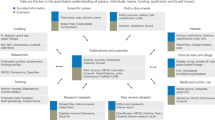Abstract
In highly industrialized societies no one can deny that three fundamental facts characterize the world of science: (1) Science has grown enormously in terms of personnel, publications, scientific disciplines, and costs. (2) The position of science in society has changed as its results became increasingly relevant — socially and politically. (3) Its contribution to economic growth increased markedly as better and more qualified manpower in general and management, organization, and planning made possible the systematic use of productive forces in particular.
Access this chapter
Tax calculation will be finalised at checkout
Purchases are for personal use only
Preview
Unable to display preview. Download preview PDF.
Similar content being viewed by others
Bibliography
Griffith, B. C. and Miller, A. J.: 1970, ‘Networks of Informal Communication Among Scientifically Productive Scientists’, in C. E. Nelson and D. K. Pollack (eds.), Communication Among Scientists and Engineers, Heath, Lexington, Mass., pp. 125–140.
Luhmann, N.: 1972, ‘Soziologie als Theorie sozialer Systeme’, Soziologische Aufklärung ( second ed. ), Westdeutscher Verlag, Opladen, pp. 113–136.
MacLeod, R. M. and Andrews, E. K.: 1968, ‘Scientific Careers of 1851 Exhibition Scholars’, Nature 218, 1011–1016.
Mulkay, M. J.: 1972a, ‘Conformity and Innovation in Science’, in P. Halmos and M. Albrow (eds.), The Sociology of Science, The Sociological Review Monograph, No. 18, Universiy of Keele, Keele, St., pp. 5–23.
Mulkay, M. J.: 1972b, The Social Process of Innovation: A Study in the Sociology of Science, Macmillan, London.
Radnitzky, G.: 1970, Contemporary Schools of Metascience, Akademiförlaget, Göteborg.
Scheler, M.: 1926, Die Wissensformen und die Gesellschaft, Der Neue-Geist Verlag, Leipzig.
Spiegel-Rösing, I. S.: 1973, Wissenschaftsentwicklung und Wissenschaftssteuerung, Athenäum Verlag, Frankfurt a. M.
Thomspon, V. A.: 1969, Bureaucracy and Innovation, University of Alabama Press, University, Alabama.
Zuckerman, H.: 1970, ‘Stratification in American Science’, Sociological Inquiry 40, 235–257.
Author information
Authors and Affiliations
Editor information
Editors and Affiliations
Rights and permissions
Copyright information
© 1975 D. Reidel Publishing Company, Dordrecht-Holland
About this chapter
Cite this chapter
Knorr, K.D., Strasser, H., Zilian, H.G. (1975). Introduction. In: Knorr, K.D., Strasser, H., Zilian, H.G. (eds) Determinants and Controls of Scientific Development. Theory and Decision Library, vol 10. Springer, Dordrecht. https://doi.org/10.1007/978-94-010-1831-9_12
Download citation
DOI: https://doi.org/10.1007/978-94-010-1831-9_12
Publisher Name: Springer, Dordrecht
Print ISBN: 978-94-010-1833-3
Online ISBN: 978-94-010-1831-9
eBook Packages: Springer Book Archive




